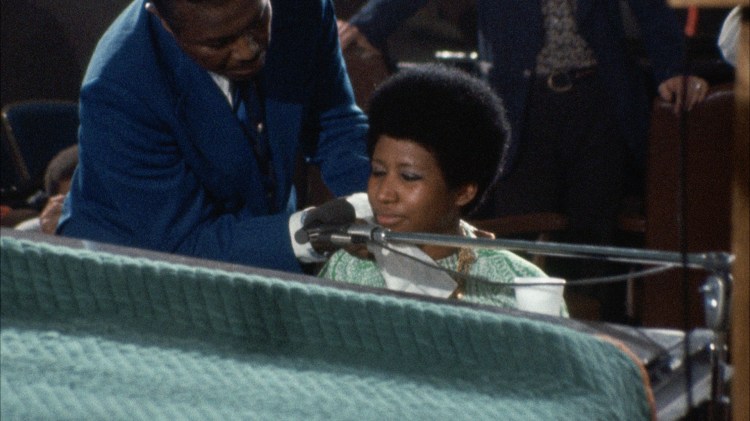I’ve always been a fan of Aretha Franklin but certainly not of gospel music. However, like everyone else, it was impossible not to stop whatever you were doing — sweeping, washing, making love — when one of her songs came on the radio.
One day, I was driving along when Aretha’s “Respect” popped on the car radio. I had to pull over, because there are some things you’re not allowed to do while driving, as in texting, swirling your hands over your head, shouting and stomping your feet.
Then there was “Natural Woman,” “Chain of Fools” and Simon and Garfunkel’s “Bridge Over Troubled Water.” That one always grabbed me.
Aretha’s gone now, and I read somewhere that she died without leaving a will. Well, she left much more; she left a shadow on the hearts of millions of fans across the planet.
Here and now, we’re presented with a very old documentary, “Amazing Grace,” that was shot in January of 1972 at the New Temple Missionary Baptist Church in Watts, a neighborhood in South Central Los Angeles, where the Reverend James Cleveland, a gospel legend himself, was the master of ceremonies. Film director Sydney Pollack was brought in to direct.
In viewing it today, as we see Pollack’s camera scan the old pews in the back and the rows of borrowed folding chairs set up front. We get a glimpse of the young Mick Jagger sitting down front and dozens of gospel singers who came to hear the dazzling young Aretha.
Aretha’s father C.L. Franklin, the well-known Baptist minister, is there, nattily garbed in a doubled vented summer suit, to provide the most touching moment in the film, a totally unexpected gesture.
In the middle of one of Aretha’s passionate gospel songs, C.L. steps out from the front row of seats and, moving to the piano, takes out a huge white handkerchief. In a pure “daddy” moment that will grab your heart, he gently wipes the perspiration from his daughter’s face and neck.
I think it’s important here to caution the fans of Aretha’s great songbook of hits: None of them appear in this film. This is a straight out, full-throated line of gospel standards, including Marvin Gaye’s “Wholy Holy.”
The film covers two nights of hard work, with multiple cameras, Pollock’s studio technicians and musicians, and the stunning back up group the Southern California Community Choir, sweating and pounding, clapping and dancing in black and silver vests.
In the middle of one rousing number, men and women in the audience explode from their seats, toss chairs aside to dance down the aisles. The scene is a primal scream of joy and faith, which only an African American Baptist church can provide.
It was these two sweltering nights in Watts that produced the famous recording of Aretha’s 1972 “Amazing Grace,” one that turned out to be her best selling album ever and is listed as the best selling gospel record of all time.
Strangely, the project was never completed. What we see on the screen seems to come to an end with applause and hugs and left over screams, as everyone walks away.
The footage, we’re told, went to sleep in vaults for decades. That’s Hollywood.
Aretha did leave a will; she left something for you, her fans. It’s called “Amazing Grace.” Go pick it up.
J.P. Devine, of Waterville, is a former stage and screen actor.
Send questions/comments to the editors.




Success. Please wait for the page to reload. If the page does not reload within 5 seconds, please refresh the page.
Enter your email and password to access comments.
Hi, to comment on stories you must . This profile is in addition to your subscription and website login.
Already have a commenting profile? .
Invalid username/password.
Please check your email to confirm and complete your registration.
Only subscribers are eligible to post comments. Please subscribe or login first for digital access. Here’s why.
Use the form below to reset your password. When you've submitted your account email, we will send an email with a reset code.